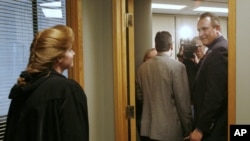A case in the Canadian province of British Columbia has the potential to overturn Canadian laws on marriage, which have banned polygamy since 1892.
British Columbia Chief Justice Robert Bauman will decide whether polygamous marriage, as currently practiced by members of a breakaway Mormon sect, is protected by the Canadian constitution’s guarantee of freedom of religion.
His ruling is likely to set off a long legal battle.
The case is rooted in a 2009 court decision to throw out polygamy charges against two men, James Oler and Winston Blackmore, the leaders of competing offshoots of the Mormon Church in a small settlement named Bountiful. The court dropped the charges based on the constitution's protection of religious freedom.
The British Columbia attorney general’s office then asked the province’s Supreme
Court to rule on the constitutionality of the anti-polygamy laws.
“The federal government has always taken the view that that law is constitutional,” says University of Western Ontario constitutional law professor Grant Huscroft. “But the responsibility for enforcing and prosecuting the law lies with the province,” he explained. “What that meant was, in effect, a federal law was not being enforced in one of the provinces,” he said.
Listen to polygamy opponent Prof. Grant Huscroft discuss the issue with VOA's Dave DeForest
Mormon church
In the U.S. and Canada, small, isolated communities for decades have quietly practiced multiple-partner marriages. Most, like the groups in Bountiful, are fundamentalist Mormons, who maintain the practice of polygamy based on religious principles derived from the early doctrines of the Mormon (Latter-Day Saints) Church.
Mainstream Mormons ended the practice of polygamy in 1890 and later made it an offense punishable by excommunication.
The effects of polygamy
A key issue for some legal scholars is whether the practice of polygamy itself is inherently harmful.
Testimony from former polygamists interviewed in the British Columbia case has been mixed. Some say they have had positive experiences in plural marriages, others say they suffered.
Bev Baines, a law professor at Queen’s University in Kingston, Ontario, suggests that some reported abuses might occur because polygamy has been driven underground and into isolated communities.
Baines says as long as the practice is illegal, it is hard to observe. “I’m arguing for decriminalization so that we can do the research to find out whether there is a problem that exists peculiarly with respect to polygamous relationships,” she said.
Listen to decriminalization proponent Prof. Bev Baines discuss the issue with VOA's Dave DeForest
“If we do think that plural marriage abuses women, we are making it worse, because they are then subject to criminal charges and incarceration for up to five years,” she said. Baines says there are already provisions in the law that can protect people against abuse.
Grant Huscroft says there is already a list of documented abuses in polygamous communities such as forced marriages, under-age marriages, the treatment of women as property, harm to children and the expulsion of boys.
“Polygamy is an inherently exploitative and harmful practice, whether it is religiously based or not, Huscroft said. “Whether or not people want to participate in it willingly, there are some things we judge to be wrong and harmful,” he said.
Multiculturalism
Bev Baines questions whether the government is failing to uphold its own principle of multiculturalism by banning plural marriages.
“I would say that the vast majority of polygamous relationships are practiced (in the minds of those practicing them) for religious reasons,” Baines says. “This is not your hippie communes of the 60’s,” she added.
Grant Huscroft worries about the effect on society of allowing polygamy.
“It will be an incredible precedent if a Canadian court, under some theory or other of human rights, were to declare a practice that I think is antithetically opposed to human rights values to be constitutionally permissible,” he said.
Huscroft says other groups besides breakaway Mormons are interested in the case. Some Muslims are also watching the outcome, due to the traditional practice of multiple partner marriages in Islam.
Libertarians, who generally oppose government action in private matters, and certain sexual minorities have also expressed interest.
Chief Justice Robert Bauman's ruling is expected this summer.




